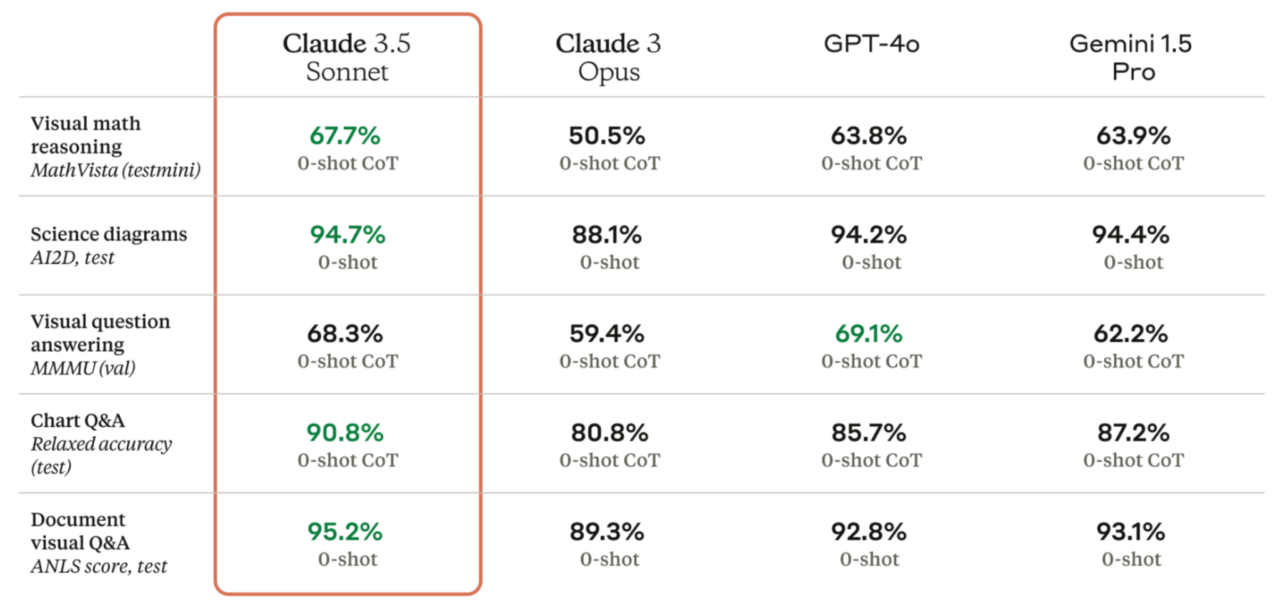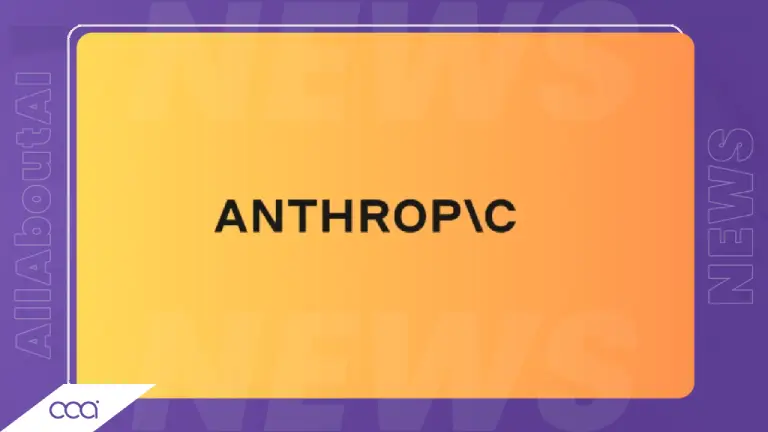Anthropic, a leading artificial intelligence research company, has announced the release of Claude 3.5 Sonnet, a groundbreaking AI model that combines unparalleled performance with cost-effectiveness.
Introducing Claude 3.5 Sonnet—our most intelligent model yet.
This is the first release in our 3.5 model family.
Sonnet now outperforms competitor models on key evaluations, at twice the speed of Claude 3 Opus and one-fifth the cost.
Try it for free: https://t.co/uLbS2JMEK9 pic.twitter.com/qz569rES18
— Anthropic (@AnthropicAI) June 20, 2024
This latest iteration of the Claude model family is set to revolutionize the enterprise AI landscape, offering businesses cutting-edge capabilities at a fraction of the cost of its competitors.
Daniela Amodei, co-founder of Anthropic, spoke with VentureBeat about the significance of this release, stating, “Claude 3.5 Sonnet is now the most capable, smartest, and cheapest model available on the market today,” Amodei said. “Out of the standard seven intelligence and capability metrics, Claude 3.5 Sonnet beats all of the competition on six of them and is quite close on the seventh. For standard vision metrics, we’re the top in the leaderboard on four out of five, and a close second on one.”
Claude 3.5 Sonnet, released just three and a half months after Claude 3.0, highlights Anthropic’s commitment to rapid innovation.
Amodei revealed, “We’ve just surpassed our flagship model, Opus, with Sonnet 3.5, and we’re pricing it at close to a fifth of the price.” This approach reflects feedback from enterprises that prioritize quality, safety, reliability, speed, and cost.
Anthropic’s focus on the enterprise market sets it apart from competitors like OpenAI, which has primarily targeted consumers with its GPT models.
While OpenAI has made strides in pushing the boundaries of AI capabilities, Anthropic has carved out a niche by tailoring its offerings to the specific needs of businesses. This strategic difference is evident in the features and pricing of the Claude 3.5 Sonnet.

Claude 3.5 Sonnet outperforms OpenAI’s GPT-4o and Google’s Gemini 1.5 Pro in key areas such as graduate-level reasoning, code generation, multilingual math, and grade school math.
The model’s strong performance highlights Anthropic’s commitment to delivering cutting-edge AI capabilities to enterprise customers. One of the standout features of Claude 3.5 Sonnet is the introduction of Artifacts, a collaboration tool designed for teams working within businesses.
“Artifacts allows teams to pull in a lot of information, like documents or case files for a legal firm, or visual assets and tone guidelines for a marketing agency,” Amodei said.
This feature enhances team productivity and innovation by enabling seamless interaction between humans and AI.
We’re also launching a preview of Artifacts on https://t.co/uLbS2JMEK9.
You can ask Claude to generate docs, code, mermaid diagrams, vector graphics, or even simple games.
Artifacts appear next to your chat, letting you see, iterate, and build on your creations in real-time. pic.twitter.com/ow77Jh7ebO
— Anthropic (@AnthropicAI) June 20, 2024
Anthropic decided not to prioritize speech input or output based on customer feedback.
“That sort of hasn’t been a top request from our enterprise customers,” Amodei said, though they are considering it for future developments.
The new Artifacts feature in Claude 3.5 Sonnet showcases its ability to collaborate with users on creative projects within a shared workspace, further enhancing its utility.
Anthropic’s rapid innovation cycle is driven by direct feedback from enterprise customers. “Part of what we believe has contributed to our ability to very quickly ship new products and features has been really just reacting and listening directly to what our customers are asking for,” Amodei told VentureBeat.
As the AI arms race heats up, with competitors like OpenAI’s GPT-4 and Meta’s LLaMA making headlines, Claude 3.5 Sonnet is poised to impact the enterprise AI market significantly. Its unmatched capabilities and cost-effectiveness are likely to attract businesses across various industries.
The release of Claude 3.5 Sonnet marks another milestone in Anthropic’s mission to push artificial intelligence’s boundaries while prioritizing enterprise customers’ needs.

Anthropic’s focus on delivering value to enterprise businesses and gathering valuable feedback promises a bright future for the company and the businesses that stand to benefit from their groundbreaking technology.
Claude 3.5 Sonnet is touted to be faster, funnier, and a more adept software engineer. Anthropic plans to follow up with two additional models, Claude 3.5 Haiku and Claude 3.5 Opus, later this year.
To complete the Claude 3.5 model family, we’ll be releasing Claude 3.5 Haiku and Claude 3.5 Opus later this year.
In addition, we’re developing new modalities and features for businesses, alongside rigorous safety testing.
Read more: https://t.co/nJAmKheKjd
— Anthropic (@AnthropicAI) June 20, 2024
Their aim is to substantially improve the tradeoff curve between intelligence, speed, and cost every few months. Claude 3.5 Sonnet outperforms the high-end Claude 3 Opus, which came out in March.

At the time, Anthropic boasted those earlier models displayed “human-like understanding.” CNET’s Imad Khan called Claude “the chattiest of the AI chatbots” and noted its easy-to-understand human-like language.
Anthropic’s model is available for free via Claude.ai and the Claude iOS app. Subscribers to Claude Pro and Team plans, paying $20 and $30 per user per month, respectively, will access Claude 3.5 Sonnet with higher daily rate limits.
This is what people worldwide have to say about Anthropic announcements!
damn, i love this back and forth happening. i can’t recall last when it was such neck to neck in tech industry
— Kush (@soy_kush) June 20, 2024
Developers can integrate the AI chatbot via Anthropic’s API. Claude 3.5 Sonnet costs developers $3 per million input tokens and $15 per million output tokens, with a 200,000-token context window.
In contrast, Gemini 1.5 Pro has a 1 million-token context window, and Google aims to expand this to 2 million tokens in 2024. OpenAI has not disclosed its parameters.
literally ran out of ChatGPT membership two days ago, lmao, almost renewed 2h ago.
I GUESS NOT.
GO ANTHROPIC WOOHOO.
— Tigran Karakhanyan (@tigran_iii) June 20, 2024
According to Anthropic, Claude 3.5 Sonnet shows “marked improvement” in understanding nuance, humor, and complex instructions.
It is exceptional at writing high-quality content with a natural, relatable tone and is adept at code translations, ideal for updating legacy applications and migrating codebases.
I love Opus! I hope Sonnet has the same human vibe
— Leo (e/acc) (@maxamly) June 20, 2024
It also has strong levels of comprehension and fluency in German, Italian, Dutch, and Russian, in addition to Spanish, Japanese, and French.
It is twice as fast as Claude 3 Opus and ideal for complex tasks like context-sensitive customer support or multistep workflows. It also interprets charts and graphs more accurately and transcribes text from imperfect images.
is 3.5 Opus coming soon as well?
— Santy Gegenschatz (@santygegen) June 20, 2024
The Artifacts feature allows multiple Claude 3.5 Sonnet users to edit generated content like documents and code in real time. This marks Claude’s evolution from a conversational AI to a collaborative work environment.
Anthropic is also developing additional features for business users, such as web search and Memory, which will allow Claude to remember user preferences and interaction history. These developments aim to enhance the model’s utility for business users.
Why are you pushing hard on AI capabilities before you’ve solved AI alignment?
Didn’t you specifically promise not to do that?
Or is the prospect of colossal wealth just too irresistible to honor your founding principles?
— Geoffrey Miller (@primalpoly) June 20, 2024
Claude 3.5 Sonnet’s context window— the amount of text the model can analyze before generating new text—is 200,000 tokens, equivalent to about 150,000 words.
Free users of Anthropic’s web client and the Claude iOS app can access it at no charge, while subscribers to Anthropic’s paid plans get higher rate limits. Claude 3.5 Sonnet is also available on Anthropic’s API and managed platforms like Amazon Bedrock and Google Cloud’s Vertex AI.
The free version seems to only have 5 message limit. The paid version will have 5x so just 25. Which is not enough and much less than GPT-4o.
— Davinder Verma — e/acc (@davinder0110v) June 20, 2024
Claude 3.5 Sonnet signifies incremental progress in AI development. Recent flagship releases from Google and OpenAI have shown marginal improvements in benchmark and qualitative performance.
As generative AI vendors focus on data curation and licensing, investors grow wary of the longer path to ROI. Despite a growing customer base, Anthropic lacks the enterprise cachet that OpenAI enjoys.
Is Claude 3.5 Haiku coming, too? This is great, and I can see why you will release Opus later, but an extremely fast and cheap, yet powerful vision model would be really awesome to have now!
— Sebastian (@omouamoua) June 20, 2024
To make inroads, Anthropic is investing in products like Claude 3.5 Sonnet, delivering better performance at commodity prices.
Michael Gerstenhaber, product lead at Anthropic, emphasized that “What matters to [businesses] is whether or not AI is helping them meet their business needs, not whether or not AI is competitive on a benchmark.”
Claude 3.5 Sonnet doesn’t entirely solve the hallucination problem but might attract developers and enterprises to Anthropic’s platform. Anthropic has doubled down on tools like its experimental steering AI and integrations to let its models take actions within apps.
It has expanded the availability of its products, bringing Claude to Europe and establishing offices in London and Dublin.
This week was named: Acceleration of Ai
— Max Layn Stein Cohen (@maxlayn) June 20, 2024
Anthropic is building an ecosystem around its models to retain customers as the capabilities gap between models narrows. Bigger and better models, like Claude 3.5 Opus, are on the horizon, with features such as web search and the ability to remember preferences.
Insane launch. Cannot wait to try. Congrats team!
— Ryan (@rsdgpt) June 20, 2024
Gerstenhaber remains optimistic about the rapid pace of innovation in deep learning, indicating that significant advancements are still to come.
Anthropic has been making huge strides in the AI industry, with numerous notable developments in 2024. 07-05-2024: Anthropic Launches Its Claude AI Platform for iPhone and iPad 03-04-2024:New Anthropic Research Paper: Many-Shot Jailbreaking 28-03-2024: Amazon Wraps Up $4 Billion Investment in Anthropic 21-03-2024: Anthropic Partners with Accenture and AWS to Accelerate AI Solutions for Organizations 14-03-2024: Anthropic released Claude 3 Haiku, The Fastest And Most Affordable Model 07-03-2024: Anthropic – Backed by Amazon and Google Launched its Most Advanced Chatbot – Claude 3 05-03-2024: Amazon Web Service Launches Claude 3 Sonnet From Anthropic AI These updates highlight Anthropic’s continuous innovation and strategic partnerships, positioning it as a leading force in the AI landscape.Other Anthropic Updates:
Claude 3.5 Sonnet represents a major leap forward in AI technology, offering unparalleled performance and affordability tailored to enterprise needs.
With its robust feature set and strategic focus, Anthropic is well-positioned to challenge established players like OpenAI and drive innovation in the AI industry.
For more news and trends, visit AI News on our website.





